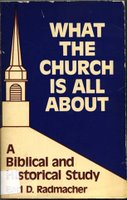
Thoughts on:
WHAT THE CHURCH IS ALL ABOUT:
A biblical and historical study
by Earl D. Radmacher
Chicago: Moody Press, 1972, 1978
441 pages
Radmacher, chapter 4: ekklesia
ekklesia is the tem most often translated "church" in the New Testament
Radmacher gives three definitions:
- non-technical: "an autonomous groups of people physically united" (p135)
- technical: "a local assembly spiritually united in Christ with an autonomous nature" (p139)... emphasis is "active, organized agency of God's kingdom" (p185)
- metaphorical: a local assembly having spiritual unity, without any reference to physical unity (p164)... emphasis is spiritual relation to Christ (p185)

All discussions of church lie along this continuum. Sometimes a theological discussion only concerns the affairs of a group of Christians regularly gathering in a specific location. Other times the discussion also includes implications, etc. regarding the gathering’s connection with Christ and one another. Still other times the discussion only concerns the affairs of all local gatherings as regarding their connection with Christ. The usage in the NT tells us that we cannot restrict the notion of church to physical, physical and spiritual, or spiritual alone, for the church always exists within physical and spiritual unity. Therefore, our spiritual unity in Christ and our physical unity in space are always a part of our nature as church. Both types of unity must be considered and honored in any theology of church—whether mostly theoretical or mostly practical.
Radmacher 1-3: The Pendulum Swings
NOTE: This is a rumination ("1. The act of pondering; meditation. 2. The act or process of chewing cud." American Heritage Dictionary) in search of synergy ("1. The interaction of two or more agents or forces so that their combined effect is greater than the sum of their individual effects.")
Tag(s): ecclesiology
“Unless otherwise noted Scripture quotations are from The Holy Bible, English Standard Version, copyright © 2001 by Crossway Bibles, a division of Good News Publishers. Used by permission. All rights reserved.” http://www.esv.org/






No comments:
Post a Comment